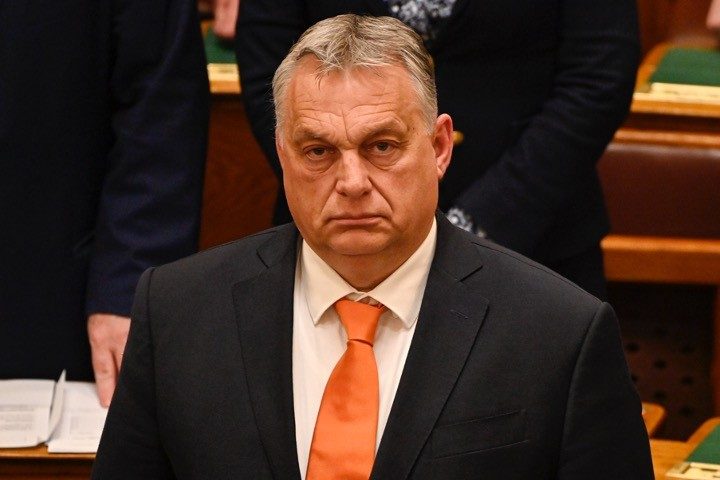
SINGAPORE — A recent leak of reportedly classified U.S. military documents has provided insights into how the United States collects intelligence, as well as what it thinks of other countries, including Hungary. According to these leaked documents, Hungarian Prime Minister Viktor Orbán is among various world leaders singled out as being under American surveillance, with the CIA cautioning that the Fidesz leader is increasingly inclined towards anti-Americanism.
A “CIA Operations Center Intelligence Update” among the leaked documents claimed Orbán listed the United States as one of his party’s “top three adversaries” during a political strategy session in February, quoting the U.S. Embassy in Budapest. Orbán’s remark “constitutes an escalation of the level of anti-American rhetoric in his discourse,” the document read. The Hungarian government declined to comment on the revelations.
For months, the American foreign policy establishment has been criticizing Hungary over its alleged lack of support for Ukraine, as well as its internal policies encouraging pro-family values and social conservatism.
The disclosure of the CIA’s surveillance of Orbán came as part of a leaked series of intelligence documents pertaining to U.S. espionage on Russia and NATO members that surfaced on online platforms such as 4chan, Discord, and Telegram. The leaks weaken Washington’s support of Ukraine, as the documents purport that officials seem to doubt Ukraine’s ability to prolong the war. Analysts have compared this year’s leaks to the 2013 Snowden exposé that the U.S. was spying on then-German Chancellor Angela Merkel. Turkey, Ukraine, and China were also included in the leaked documents.
Washington has staged a strong diplomatic offensive undermining Orbán’s government via the U.S. Embassy in Budapest. Headed by U.S. Ambassador to Hungary, David Pressman, an outspoken critic of Orbán, one round of the offensive entailed a nationwide billboard campaign with the message, “Ruszkik Haza!,” or “Russkis Go Home,” a popular slogan used in the 1956 Hungarian uprisings against the then-Soviet Union. The billboards put the phrases “Hungary 1956” and “2023 Ukraine” together, above and below the main inscriptions.
The billboards contradict the official stance of the Hungarian government, which from the outset of the Russo-Ukraine crisis last year has called for the West to pursue a “cease-fire and peace talks.” Frequently over the past year, Hungary has decried the Biden administration’s increasingly provocative actions in Ukraine, blasting Washington for prolonging the brutal conflict by sending billions in military aid to Ukraine.
In January of this year, Hungarian Foreign Minister Péter Szijjártó, who has had a tense relationship with Pressman, commented, “We understand that this [war] does not seem so serious from a hundred or a thousand kilometers away, but whoever causes an escalation or prolongation of the war is also acting against our national interests,” referring to the U.S. government’s persistent and widespread military backing for Ukraine.
Last October, during a panel discussion in Berlin organized by Cicero magazine and the daily newspaper Berliner Zeitung, Orbán said:
The Ukrainians have endless resources because they get all that from the Americans.… That is why the Americans have to come to an agreement with the Russians. And then the war will be over. [Those who] believe the war will be ended through Russian-Ukrainian negotiations are not living in the real world…. Hope for peace is named Donald Trump.
Gergely Gulyás, chief of the prime minister’s office, said that the U.S. embassy “has launched a pro-war campaign.”
The Washington-backed billboard campaign calling into question the stance of Orbán’s government on the Russo-Ukrainian conflict was coordinated by the U.S. embassy in Budapest, the pro-war Nyugati Pályán Facebook page, and a public relations firm called Flow PR. It came amid frosty bilateral relations between Hungary and the United States, as well as speculations that U.S. Agency for International Development (USAID) chief Samantha Power is setting the stage for a future anti-Fidesz color revolution.
On April 12, Pressman organized a news conference in Budapest to voice his opinions over “the continued eagerness of Hungarian leaders to expand and deepen ties with the Russian Federation despite Russia’s ongoing brutal aggression against Ukraine and threat to transatlantic security.”
The American diplomat had purportedly informed the anti-Fidesz news outlet 444.hu ahead of the other media that there would be a press conference. Citing various independent diplomatic sources, 444.hu reported that the Biden administration was planning to impose new punitive measures, similar to U.S. sanctions imposed on Hungary in 2014, on the Hungarian government for its current stance on the Ukraine conflict.
Pressman’s conference statements went hand-in-hand with new U.S. Treasury sanctions imposed on the Hungary-based International Investment Bank (IIB), which the Treasury slammed for serving “as a mechanism for corruption and illicit finance, including sanctions violations.”
Moreover, Pressman declared that three senior officials of the IIB, including a Hungarian citizen, Imre Laszlóczki, former Hungarian ambassador to Azerbaijan, and two Russian nationals, Nikolai Kosov and Georgi Potapov, have been included in a list of sanctioned individuals. He further claimed that the IIB was an arena for Russia to increase its regional clout, and was thus a potential threat to the European Union (EU) and its Western allies.
Pressman said that Washington had voiced misgivings to Budapest after the IIB shifted its headquarters to Hungary from Moscow. “Hungary is treating the International Investment Bank as guests, and the staff have diplomatic passports; these questions need to be addressed,” he said.
When asked whether more sanctions would come should the Hungarian government not abide by U.S. demands, Pressman evasively replied that U.S.-Hungarian collaboration was in his country’s interests, and claimed that both countries “are in the same boat” as allies.



